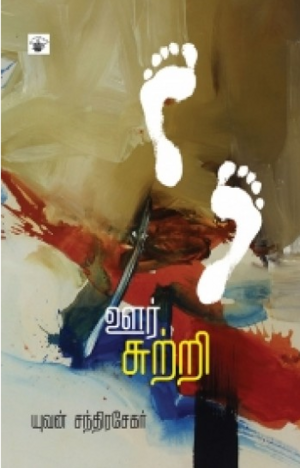Oorsutri: Difference between revisions
Balajiraju (talk | contribs) (Saving final version for further review) |
(Corrected error in line feed character) Tag: Manual revert |
||
| (7 intermediate revisions by 4 users not shown) | |||
| Line 1: | Line 1: | ||
{{Read Tamil|Name of target page=ஊர்சுற்றி|Title of target page=ஊர்சுற்றி}} | {{Read Tamil|Name of target page=ஊர்சுற்றி|Title of target page=ஊர்சுற்றி}} | ||
[[File:ஊர்சுற்றி2.png|thumb|Oorsutri]] | |||
Oorsutri (2016) is a novel written by Yuvan Chandrasekar. Sitapathi goes away from the village and returns after a long time and narrates his life stories to another person. The novel unfolds through his different experiences. | |||
== Writing, Publication == | == Writing, Publication == | ||
Yuvan Chandrasekar wrote this novel in 2016 and published by Kalachuvadu Publishing. | [[Yuvan Chandrasekar]] wrote this novel in 2016 and published by Kalachuvadu Publishing. | ||
== Synopsis == | == Synopsis == | ||
Unable to stay in the village after the untimely death of his parents, Sitapathi, who left as a nomad in 1936 at the age of sixteen, returned to the village in his eighties to spend his last days in the village where he was born. He tells his life to Kamalakannan, who comes to the village for film shooting, to ask him about his life. | Unable to stay in the village after the untimely death of his parents, Sitapathi, who left as a nomad in 1936 at the age of sixteen, returned to the village in his eighties to spend his last days in the village where he was born. He tells his life to Kamalakannan, who comes to the village for film shooting, to ask him about his life. | ||
In this novel, written with the 'unreliable narrator' technique used in fiction, Sitapathi talks about his life on different platforms such as sex | In this novel, written with the 'unreliable narrator' technique used in fiction, Sitapathi talks about his life on different platforms such as sex and magical events. | ||
== Literary Significance == | |||
== Literary | |||
When assessing the novel, Cuddalore Cheenu says "''The novel tends to approach and consider the basic questions that literature considers such as lust, loneliness, life and spirituality, with the pretense that there is no such central question.''" | When assessing the novel, Cuddalore Cheenu says "''The novel tends to approach and consider the basic questions that literature considers such as lust, loneliness, life and spirituality, with the pretense that there is no such central question.''" | ||
== References == | == References == | ||
* [https://padhaakai.com/2018/08/11/oor-sutri/ Oorsutri - Cuddalore Cheenu, Pathagai] | |||
* [https://padhaakai.com/2018/08/11/oor-sutri/ | {{Finalised-en}} | ||
{{ | |||
[[Category:English Content]] | [[Category:English Content]] | ||
Latest revision as of 20:08, 12 July 2023
இந்தப் பக்கத்தை தமிழில் வாசிக்க: ஊர்சுற்றி
Oorsutri (2016) is a novel written by Yuvan Chandrasekar. Sitapathi goes away from the village and returns after a long time and narrates his life stories to another person. The novel unfolds through his different experiences.
Writing, Publication
Yuvan Chandrasekar wrote this novel in 2016 and published by Kalachuvadu Publishing.
Synopsis
Unable to stay in the village after the untimely death of his parents, Sitapathi, who left as a nomad in 1936 at the age of sixteen, returned to the village in his eighties to spend his last days in the village where he was born. He tells his life to Kamalakannan, who comes to the village for film shooting, to ask him about his life.
In this novel, written with the 'unreliable narrator' technique used in fiction, Sitapathi talks about his life on different platforms such as sex and magical events.
Literary Significance
When assessing the novel, Cuddalore Cheenu says "The novel tends to approach and consider the basic questions that literature considers such as lust, loneliness, life and spirituality, with the pretense that there is no such central question."
References
✅Finalised Page

